Beauty School
You may remember Soco, whose quinceaños party we attended awhile back in her home town of Oxtapakab, about 40 km south of Merida. Soco is the youngest daughter of Brigida, the Mayan woman with the Irish name who cleans our house every week. (Brigida and Bernabe, her husband who still works in the milpas or corn fields, have 3 daughters and 2 sons, and 1 grandson). Since quitting school after the sixth grade, Soco had been staying home and helping around the house. Her mother told us that she was not interested in continuing her schooling. About six months ago, Soco must have gotten bored or realized she needed money, as she began accompanying Brigida every week, helping to clean both our house and office one day a week, and thus earning some extra money.
A few months ago, when Soco and Brigida were ready to leave, we noticed that Soco was dressed and made up as if she was going somewhere important. We asked what the occasion was and she told us that she had started attending Escuela de Belleza (Beauty School). About a month or so later we asked her about her school progress, and her face fell as she told us that she had stopped attending because her family really couldn't afford it.
After contemplation and discussion over the next few weeks, we offered to pay for Soco's schooling. The cost of $690 pesos (about $65 US) a month for one year with maybe an extra $100 pesos ($9US) per month for supplies costs less for one year than putting our own daughter through college in the States costs in a *month*. Realizing that her prospects without schooling were extremely limited, we decided that this was a way to help Soco create a more hopeful future that would not be limited to cleaning gringos' houses.
We learned that she wanted to attend Tania Beauty School, which faces Parque San Juan south of the Plaza Grande. She had chosen Tania Beauty School because her older sister, Mari, who works in a maquiladora in Tecoh, had told her that all of the best local hairdressers come from this particular school.
The next week, after the morning cleaning was done, we accompanied Soco and her mother down to the school to sign up. The lady at the desk outlined two different options: $400 pesos a month for two years at a slower pace or $690 pesos a month for one year. Agreeing that so many things can change in the course of two years, we agreed on the one-year program.
Soco turned over her birth certificate, some photos of herself and a certificate of completion of primaria (primary school, i.e. first through sixth grade) and the deposit of the first month's tuition. We had gotten lucky and come at a time when the $250 peso sign-up fee was being waived as a promotion. She was given a choice of coming at 9 am, 11 am, 2 pm or 5 pm daily, five days a week. Since she must travel an hour each way by combi (van) or bus, she decided to take the 11 am slot. She was told that she will be taking classes in hair cutting, hair coloring and hair styling as well as makeup, manicures and pedicures.
She was instructed to wear closed-toe shoes, the school t-shirt and blue pants while in school each day. The pants were not a problem because blue jeans are accepted, and being the modern Mayan that she is, Soco owns a few pairs of blue jeans. But being a Mayan living in the countryside, Soco doesn't own a pair of closed-toe shoes, so we bought her a pair on the way home.
She was given a receipt, an attendance card with instructions on how to deposit the tuition into the school's Banamex bank account and a list of supplies needed for the first day.
The supply list was typed up on a tiny piece of paper, smaller than a Mayan fist. Supplies listed included hair clips (called mariposas or butterflies), brushes and combs, a spray bottle, two school t-shirts, a school uniform jacket and a maqui, or manniquen head with real hair. The maquis were on backorder so she has to pick that up later. There was a brief moment of excitement when she tried on the uniform and couldn't help but smile, but most of the proceedings were carried on with much Mayan seriousness on all sides, with the crazy gringa snapping photos over in the corner. Soco walked out with two bags of supplies, an attendance card and a new pair of shoes.
Today is the first day of class, and the first day of Soco's future. Buena suerte, Soco! Good luck!




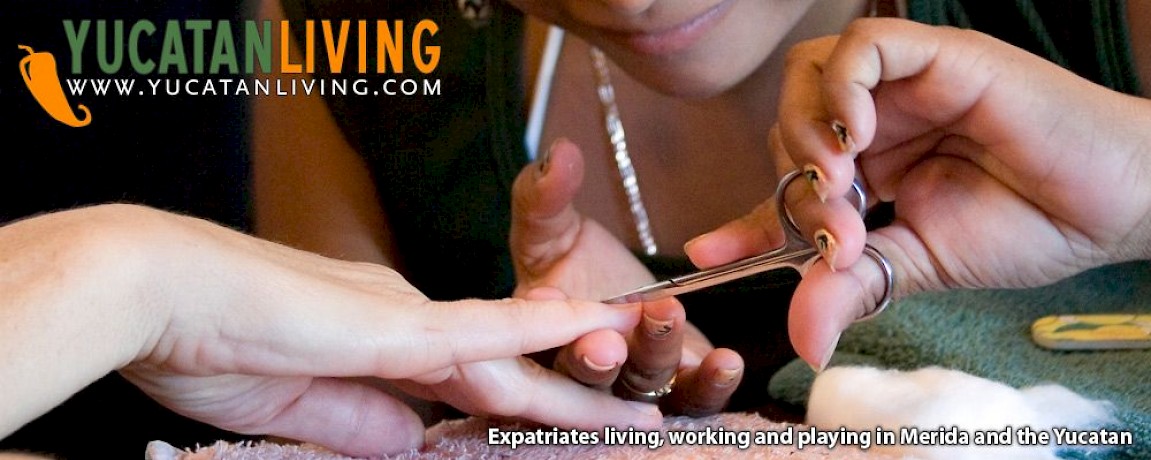


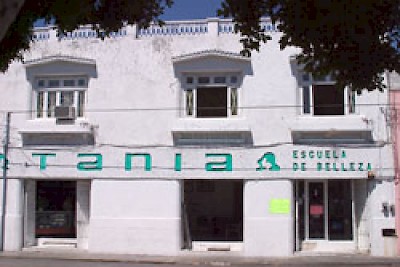
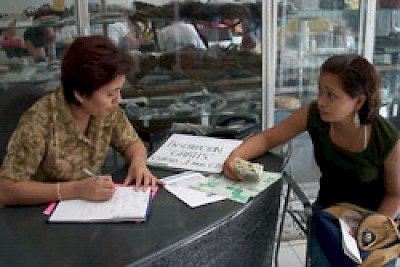
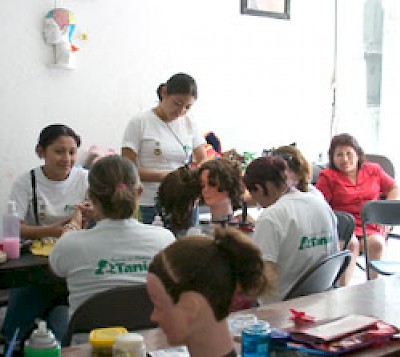
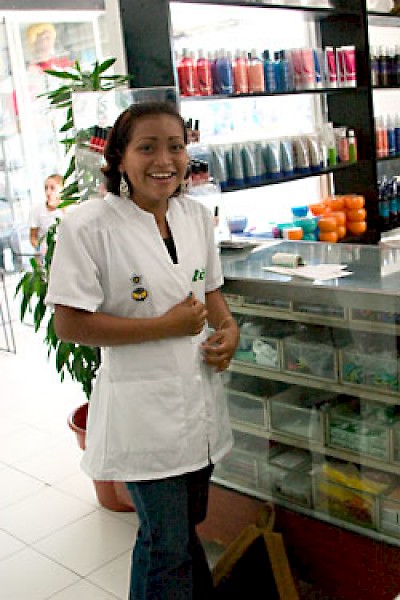

Comments
Jane 17 years ago
Hola,
I enjoyed reading this story. Came across it while searching on the site for a hairdresser in Merida. Planning a trip there next week and thinking I might have my long locks cut if there is time. I did not see a date on this article. Is Soco doing hair in Merida now?
Reply
Brenda Thornton 18 years ago
This is a super thing for you to do, and I wish this young woman the best.
We had a Venezuelan housekeeper once a week, who was here legally, as her husband was a minister to a local congregation, for their Spanish-speaking portion of the congregation.
She had what would have been an Associate Degree in Accounting from Venezuela, but her extremely limited English kept her from working in the U. S. in that field.
She spoke very little English when she started, but I wrote Post Its, with the English words on things, and the Spanish word, if I could figure it out, and would help her with her pronunciation, and work alongside her to teach her how I wanted things. It was so darned funny, as we had rescued a little dog saved by a vet of a friend, and we were having difficulty with him, as he snapped at the Gringa, and didn't really want to cooperate. When Deniece arrived, and started talking to him in Spanish, he became excited and responded to her, and did just what she told him to do. MY DOG SPOKE SPANISH. After working with him, he became the most special little dog.
I was a medical professional before becoming disabled but I have a Bachelor Degree in Liberal Arts, as well, so I soon proposed that she spend the first hour each week during her time with me on English. She was taking English as a second language, but she was shy and didn't seem to be getting much from it, so we went over her material one on one and I also helped her with conversational English, and within a year, she had grown very confident.
Later, she mentioned she would like to get a job but really didn't know what to do, and despite the fact that I detested losing her, I suggested that she might be able to get a good job as a bilingual aid with our local school system, and she did, and I gave her an excellent reference, as did she to the Principal, when the Principal asked her how she had done so well with English in such a short time.
If we move to Mexico, I may see if I can do some teaching, on a volunteer basis, for English as a Second language, and maybe they can assist me with my Spanish.
Reply
maya 18 years ago
that's a beautiful story and it was nice from you to helped the Mayan girl. Dios botik means gracias. The mayan language has been mixed with Spanish words even thoug if it is not mixed it will continue to change with the invention of new words, such as telivision, internet, etc. etc. Chak botik is the proper way to say gracias in mayan; Mayan is a dialect but it is also a language by itself.
Reply
Working Gringos 19 years ago
Yucateco: Pues... your English is better than our Spanish. Great to hear from you. Hope we meet when you get back from Spain.
Reply
yucateco 19 years ago
In order that my english sucks:
=D
Reply
Neil 19 years ago
Your story about supporting the student at beauty school touched me. That's great of you to be giving back to your community in such a personal way.
I've been reading your blog for awhile; Chris Brown is an old friend of mine and I followed the link from his website. Fun to read about you expats - my wife and I may join the crowd someday.
Reply
David Moreno 19 years ago
That was a nice story..
Reply
KAT 19 years ago
Beautiful beauty school piece, y'all. You'll have me looking at beauty schools with a different eye.
Reply
Working Gringos 19 years ago
Thanks for the comments, folks. The May family has been very generous to us as well, opening their home and lives to us in ways that have let us experience rural Yucatec Mayan traditions. They have enriched our lives in ways that money can't buy.
Chris, the Mayans don't have an expression like "Thank you," instead they say "Dios bo'oh tik", which means "God pays it." (Before the Spanish arrived, they used to say "Chaac bo'oh tik", or so we're told.) Their philosophy isn't much different from the Beatles':
"And in the end,
the love you take
is equal to the love
you make."
"The End" - Abbey Road
Reply
You Know Me 19 years ago
As the Beatles sang "The love that you get, is equal to the love that you give", or something like that. Your loving generosity has surely added to your reservoir.
Reply
Joe 19 years ago
What a genrous thing for you to do!
Reply
« Back (10 to 21 comments)Next »